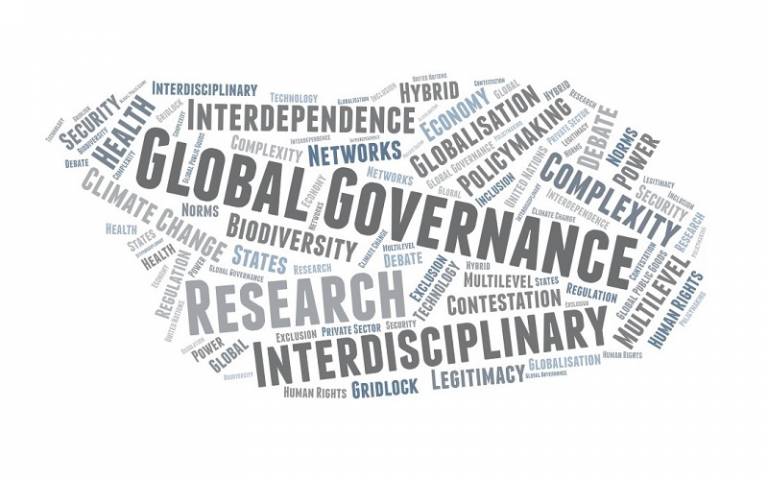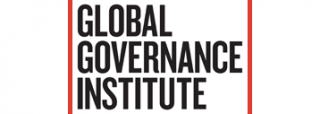Global Governance Institute: Looking Toward 2020-2021
2 July 2020
What is the future of multi-level governance in a complex, interconnected and rapidly changing world?

As Lenin is said to have remarked, "there are some weeks when nothing happens and some weeks when decades happen". 2019-2020 has brought home to all of us the discombobulating effects of living through major historical events in real time. As events gather speed, we also confront a major challenge in finding signal amidst the noise of social media. And we’re not alone. The WHO Director-General laments the fact that “we’re not just fighting an epidemic; we’re fighting an infodemic” of fake news, while the Bulletin of the Atomic Scientists warns of existential dangers being compounded by a manipulated media environment.
The Global Governance Institute (GGI) aspires to serve as a space at UCL for amplifying signal through dialogue, reflection and informed public debate on the formidable challenges facing humanity and possible global responses. This past year has demonstrated the vital importance of the GGI’s core mission. From climate change, the impact of COVID-19, to hyper-concentration of wealth and exponential technology, we are facing a growing number of enormously complex risks that will accelerate faster than most people can intuit. Yet, governance structures at all levels – global, regional and local – are widely viewed as failing to address these risks. As political support for multilateralism continues to rapidly erode, UN Secretary General Antonio Guterres recently warned of “a great fracture” imperilling the entire multilateral system.
Coronavirus is a failure of global governance. The WHO should serve a vital global function, mitigating against the risk of states becoming overwhelmed and reducing the destructive impact unmanaged economic globalisation has had on public health systems, many of which have been left ill-prepared to deal with COVID-19. Yet, as with the UN’s human rights and climate change agencies, the WHO finds itself embattled – at the mercy of obstructive member states and saddled with dwindling resources. It enjoys few effective tools to directly monitor outbreaks of infectious disease, coordinate pandemic planning, allocate resources to those countries most in need, or ensure effective preparedness implementation at country-level.
Nevertheless, as recent GGI Visiting Professor Amitav Acharya suggests, rather than despairing about the apparent ‘disorder’ we should seek to explain how the world is being ‘reordered’ and what this means for the future of global governance. It is important to not mistake the gathering complexity for crisis. Complexity is the norm, not the exception in world politics. Contrary to conventional belief, ‘constrained breakdown’ may even be desirable; setting in motion processes of restructuring, renewal and long-term adaptation. Whether or not existing global governance configurations such as the UN can be repurposed to address systemic global risks remains an open question, and one which the GGI will be tabling in 2020-21 with respect to the global pandemic response and, of course, at the make-or-break UN Climate Conference COP26 to be hosted in Glasgow next year.
It is also a moment for reflecting on macro-questions, with pioneering global politics scholarship inquiring into a ‘pragmatic radical’ rethink of how we understand and ‘do’ multi-level governance in a complex, interconnected and rapidly changing world. Is it possible to (geo-)engineer expert solutions to restore and protect a thriving natural world and biosphere? What models of collective choice-making can better uphold the integrity of our governance systems? Is it possible to prevent harm that is incentivised by the geopolitical and macroeconomic system? In a post-COVID world, how will we address the shocking disparities observed worldwide in the health of socially and economically-disadvantaged compared with more advantaged populations? The daunting political and ethical challenges posed by our globalised social, economic and technological systems, coupled with exponential human consumption and extraction patterns, may yet prove to make robust and legitimate global governance essential, even while it appears increasingly untenable, or for many critics, undesirable.
Notwithstanding the challenges posed by the new working environment (and patchy Wi-Fi!), the GGI will continue to provide a platform for this vital debate. We will host a major conference in 2021 on Future Scenarios in Global Governance, as part of an EU-funded Horizon 2020 global research consortium and have plans to collaborate with UCL colleagues on events related to biodiversity, artificial intelligence, business and human rights, among others. We are very grateful for the ongoing support of our GGI thematic research directors, Dr Zeynep Bulutgil and Dr Manuel Vogt (Global Security - UCL Political Science), Professor Barnali Choudhury (Global Justice - UCL Laws), Professor Georgina Mace (Global Environment - UCL Biosciences), and Dr Julius Mugwagwa (Global Health - UCL STEaPP), for their contribution to enhancing our mission at UCL, as well as the enthusiastic collaboration of our students on the MSc programme in Global Governance and Ethics at the Department of Political Science/School of Public Policy.
Institute activities in 2020-21 will also probe the viability of governing at a planetary scale, inviting leading scholars and practitioners to debate government and governance from the lowest to the highest level of political assembly, what is broken and how might it be fixed. There are no simple answers to these questions. In the face of an ill-defined future, the GGI will continue to serve as a hub for the distinctive cross-disciplinary strengths of UCL to be brought to bear on this vital enterprise: exploring the possibilities of global governance, and how it might look in the future if the global ecumene is to overcome some of the intractable issues it faces today.
 Close
Close


